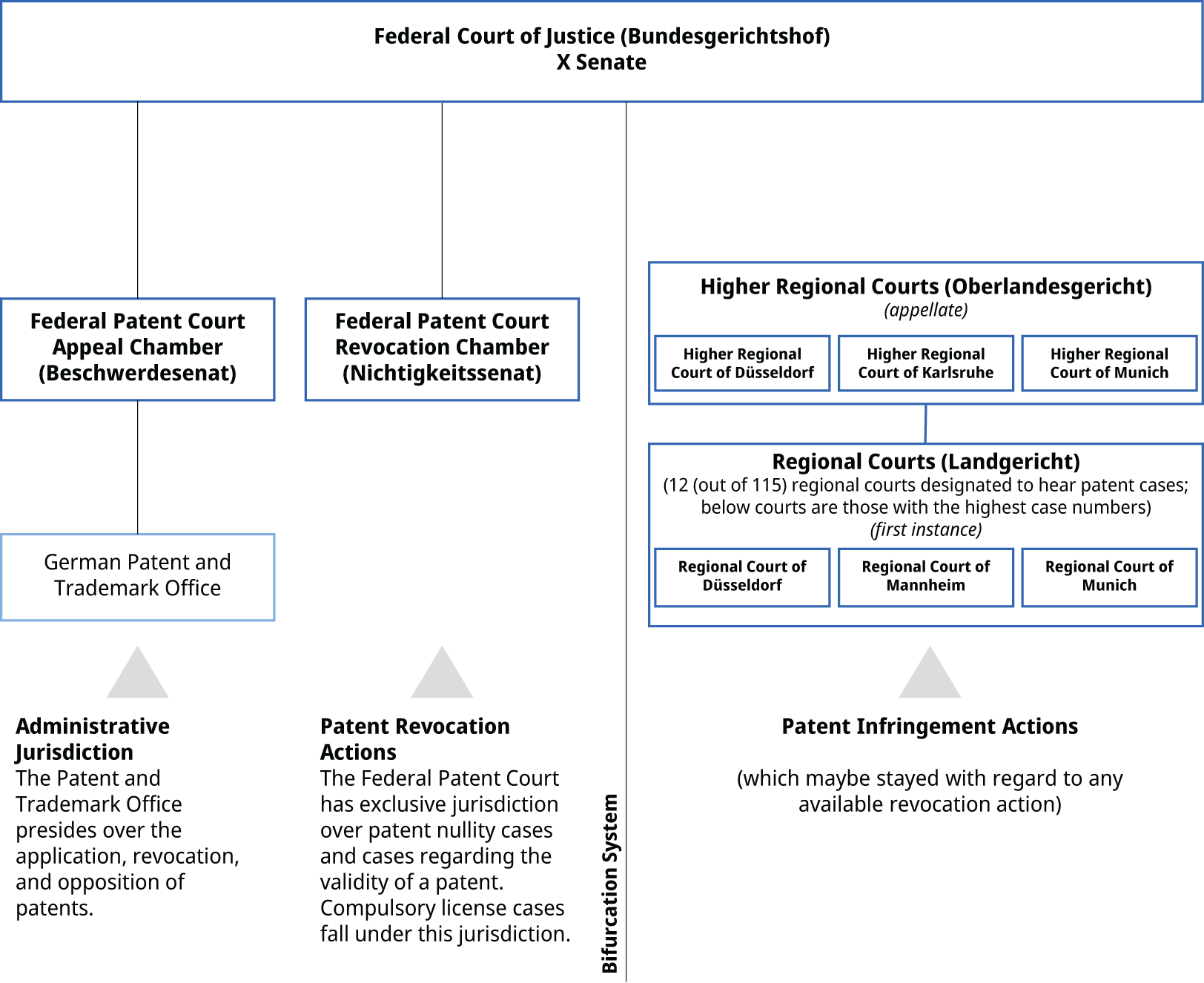5.3.1 Judicial administration structure
Germany is constituted as a federal republic of 16 states (“Länder”). According to Article 92 of the German Constitution,9 there are both federal courts and state courts. To preserve uniformity of decisions, according to Article 95(1) of the Constitution, the FCJ was established as the appellate court for state courts in the last instance. If all other legal remedies are exhausted, then, under specific circumstances, a constitutional complaint may be filed to the Federal Constitutional Court (“Bundesverfassungsgericht”) established under Articles 92–94 of the Constitution.
Despite the general competence of regional courts, an infringement suit cannot be filed with just any regional court in Germany; rather, there are 12 (out of 115) regional courts that have been designated to hear patent infringement cases. Most cases are heard by the Regional Court (“Landgericht”) of Düsseldorf, the Regional Court of Mannheim or the Regional Court of Munich. While the jurisdiction of each regional court is limited to a certain geographical area – that is, one or several states – all courts will assume jurisdiction if infringing products are offered on the internet. The Regional Court of Düsseldorf and the Regional Court of Munich both have three specialized chambers for patent matters, whereas there are two specialized chambers at the Regional Court of Mannheim.10 The chambers at the regional court level consist of three specialized judges. Although these judges are trained lawyers – most of them without technical backgrounds – they generally have significant experience in patent cases and have a profound understanding of various technical fields.
For each regional court, there is a corresponding higher regional court (“Oberlandesgericht”) as the appellate court. Due to the focus on the regional courts of Düsseldorf, Munich and Mannheim in the first instance, most appeals are filed to the higher regional courts of Düsseldorf, Munich and Karlsruhe respectively. At the higher regional court level, designated senates of three judges hear appeals in patent infringement cases. Notably, at the Higher Regional Court of Düsseldorf, there are two senates established to hear patent infringement appeals.
At the FCJ, the X Senate hears appeals from the higher regional court level, with a bench of five judges on questions of law. The senate, however, will only hear appeals from a higher regional court if leave was given either by the higher regional court or, upon appeal against a negative decision by the regional court, by the FCJ itself.
The FPC in Munich has exclusive jurisdiction over patent nullity actions. Depending on the International Patent Classification (IPC) classification of the patent-in-suit, cases are assigned to one of the seven nullity senates (“Nichtigkeitssenate”) at the FPC. Cases at the FPC are decided by a panel of five judges. In contrast to infringement proceedings, only the presiding judge and one associate judge are lawyers, while three associate judges have a technical education and have often been patent examiners prior to their appointment as judges. Decisions by the FPC can be appealed to the FCJ, where the X Senate (the same senate as in infringement cases) is competent. The judges at the FCJ are all lawyers without necessarily having an additional technical background.
In patent infringement cases, representation by a fully qualified lawyer (“Rechtsanwalt”) is required. Regularly, especially in cases concerning complex technologies, lawyers will be supported by patent attorneys (“Patentanwalt”) who have a technical background in the respective field of technology. By contrast, in validity proceedings at the FPC and invalidity appeal proceedings at the FCJ, aside from lawyers, patent attorneys are entitled to represent clients. Typically, a close alignment is required between lawyers acting in the infringement proceedings and the patent attorneys handling the validity proceedings.
Figure 5.2 shows the judicial administration structure in Germany.
Figure 5.2 The judicial administration structure in Germany

The Regional Court of Munich just recently introduced a third chamber, which commenced work on Aug. 16, 2021.